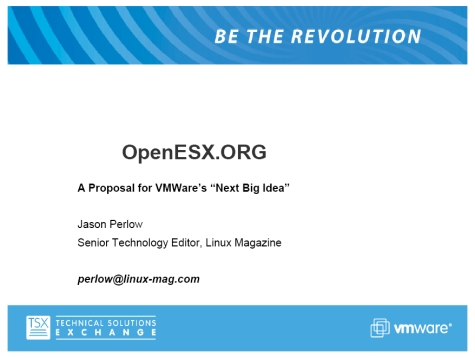VMWare: Time to Pay the Open Source Piper

 It would not be an exaggeration to say that yesterday was a very bad day for VMWare.
It would not be an exaggeration to say that yesterday was a very bad day for VMWare.
My friend and fellow tech blogger colleague at ComputerWorld, Steven J Vaughn-Nichols, thinks the company will be down for the count when they take their next hit, that essentially, the company should be treated like the walking dead. As he sees it, Open Source hypervisors and Microsoft's Hyper-V will sweep away the market share of their overpriced ESX Server bread and butter product, and the company will quickly become a has-been.
I'm not entirely sure I agree with his point of view. Yes, VMWare needs to take corrective action. Yes, Hyper-V, Xen, KVM and containerized solutions will present huge challenges for VMWare's expensive product when comparable virtualization services are free or baked into existing OSes. VMWare still has a technological lead over the competition in terms of raw feature set, but these gaps are quickly narrowing if you consider the value added services for these no-frills hypervisors being created by companies like Novell/Platespin, Red Hat, Qumranet, Citrix and Sun. VMWare needs to interpret these trends and yesterday's wake up call as a warning sign, a portent of what could happen to the company if it continues on its existing arrogant and non-competitive path.
I believe what VMWare had yesterday could only be described as a "Come to Jesus" moment -- a sign that if they ignore changes in the industry and maintain their arrogance, that they will in fact be staring at their own gravestone.
What changes does the company need to make? So far, they ain't doing so good with the ones they've already put in place -- they've switched out their President and CEO and ejected the company's founder, a practice that never sits well with me. That being said, Paul Maritz knows how to run technologically sophisticated companies -- a 14 year veteran of Microsoft, he was head of its Platforms Strategy and Development group before he left the software giant in 2000.
Not all of you may remember that Maritz was called upon the stand in 1999 as a expert witness in the landmark Microsoft vs. DOJ antitrust trial, where he was examined by Microsoft's defense attorney, John Warden, as a means of pointing out that Microsoft indeed had competition in the form of Linux and other alternative operating systems.
Warden: Mr. Maritz, if you'll turn to the second page of the article, there is a statement attributed to Mr. O'Reilly there, of O'Reilly and Associates, which reads, "Open Source has already radically changed the computer industry. In the first round, Open Source software will not beat Microsoft at its own game. What it is doing is changing the nature of the game."
Now, is that statement consistent with points you've made in your testimony?
Maritz: It is, Mr. Warden. As I pointed out, this is one of the key changes that we've seen in the software industry over the last year or so. And it really is a major factor that we all have to take into account, that there is this source of fairly sophisticated, high-quality software that is being developed by the open-source movement.
And it further puts pressure on ourselves and other manufacturers of software or developers of software to continue to innovate and make sure that we're offering our customers value for money.
Maritz could observe this trend way back in 1999, and he saw the writing on the wall, this despite the fact that Linux and Open Source software was not even close to being mainstream at the time. In 2000, he left Microsoft to form his own company, Pi Corporation, which was acquired by EMC in February of 2008.
I certainly hope that Paul Maritz realizes that VMWare cannot afford to go down the same path that Microsoft went, and must continue to add value in the same way he described Microsoft needed to do. In fact, I am hoping that he understands that in order to continue to be competive, VMWare needs to get away from its hypervisor being held close to the vest, and instead open it up to outside development so that they may continue to grow VMWare's ecosystem and add differentiation and value add with their other products, such as Virtual Desktop Infrastructure (VDI). To combat Hyper-V, Xen and KVM, ESX has to join the Open Source party.
In April of 2007 I was invited to make a presentation at VMWare's TSX conference in Las Vegas to propose that the company do that exact thing. When I was done, the audience applauded, and I was essentially told by VMWare's management "Neat idea, but we aren't ready and see no need to do so anytime in the future. Thanks for your time, and have this nice T-Shirt as a consolation prize."
I'd be happy to present this idea again, Mr. Maritz.
Should VMWare Open Source ESX Server? Talk Back and let me know.The postings and opinions on this blog are my own and don’t necessarily represent IBM’s positions, strategies or opinions.
